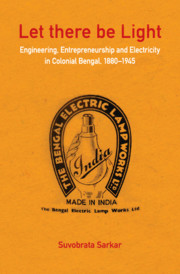Book contents
- Frontmatter
- Contents
- List of Figures
- Preface
- Acknowledgements
- List of Abbreviations
- Introduction
- 1 Technical Knowledge and Its Institutes
- 2 Entrepreneurship, Industry and Technology
- 3 Electrification: The Shaping of a Technology
- 4 Domesticating Electricity
- 5 Assimilation of Technological Ideas
- Conclusion
- Bibliography
- Index
Preface
Published online by Cambridge University Press: 30 April 2020
- Frontmatter
- Contents
- List of Figures
- Preface
- Acknowledgements
- List of Abbreviations
- Introduction
- 1 Technical Knowledge and Its Institutes
- 2 Entrepreneurship, Industry and Technology
- 3 Electrification: The Shaping of a Technology
- 4 Domesticating Electricity
- 5 Assimilation of Technological Ideas
- Conclusion
- Bibliography
- Index
Summary
LET THERE BE LIGHT is a sacred phrase: It is found in Genesis 1: 3 of the Torah. There it is mentioned, in the beginning God created the heavens and the earth. The earth was formless, and darkness prevailed all around. Then God said, ‘Let there be Light’, and there was light. God saw that light was good and thus separated it from the darkness. God called the light ‘day’, and the darkness ‘night’. However, now in modern times, after sunset, another day emerges – night, with its electric lights, is sometimes brighter than the day! Just imagine what would have been our state of existence without electricity. Modern industry could not exist without it. The transformation of science into economic goods is not new. There have been many instances of scientific ideas transforming into industrial practice since the advent of the Industrial Revolution, the classic example being the electrical industry. What is new is the magnification of this process, including the shortening of the time span between invention and application, and the increased reliance of entrepreneurs on knowledge manufactured in academic institutions.
The significance of the history of technology is realized when technology is understood not simply as an artefact or technique, but as part of the history of a culture and of the social and intellectual development of human civilization. There was a close connection between commercial interests, technological changes, and government policy in India from the early years of British rule. Western technologies are significant, Roy Macleod and Deepak Kumar emphasize, not only as ‘tools’, but also as forms of knowledge, occasionally mentioned as technical education in the colonial archives. From an artefact to a modern machine, a certain amount of knowledge must be embedded in it. The use of the term ‘techno-science’ in this book is to explain the application of scientific knowledge (both pure and applied) for technological solutions, sometimes loosely used in the literature as ‘engineering sciences’. Several new technologies came to India as colonial baggage. However, Indians were not mere spectators; on numerous occasions they manipulated and contributed to the domestication of modern technologies.
Information
- Type
- Chapter
- Information
- Let there be LightEngineering, Entrepreneurship and Electricity in Colonial Bengal, 1880–1945, pp. vii - viiiPublisher: Cambridge University PressPrint publication year: 2020
